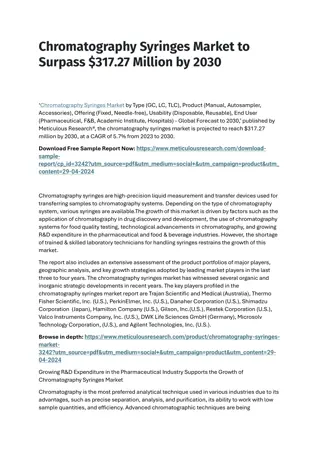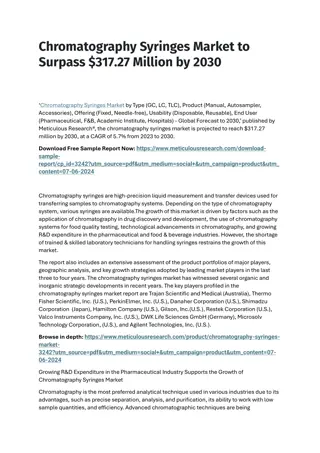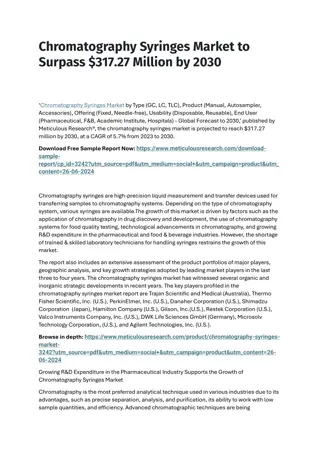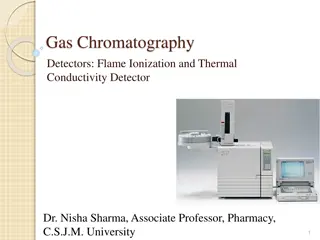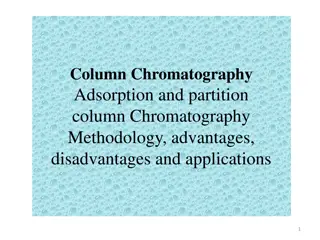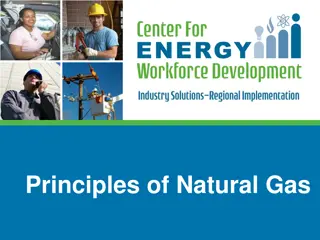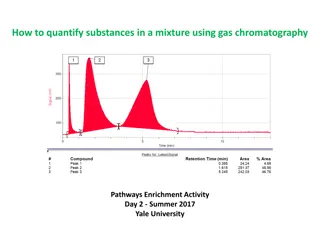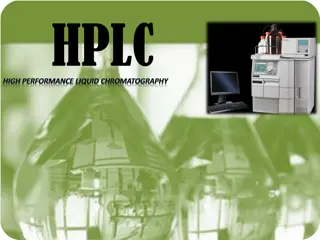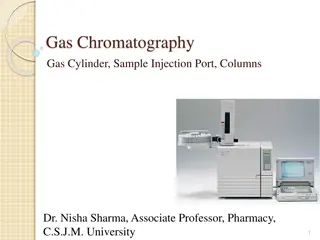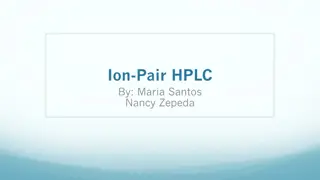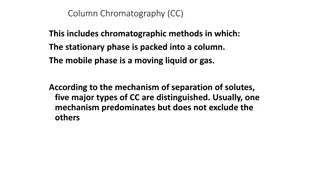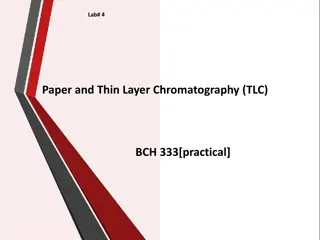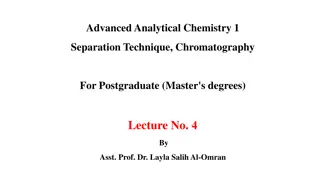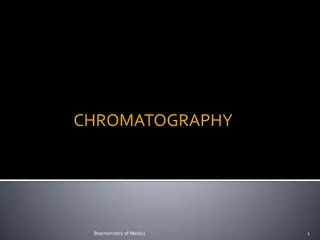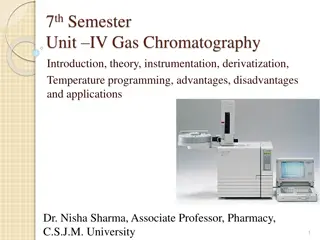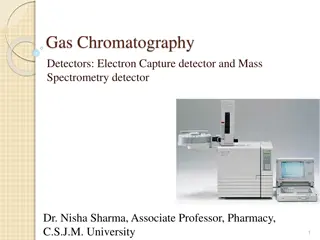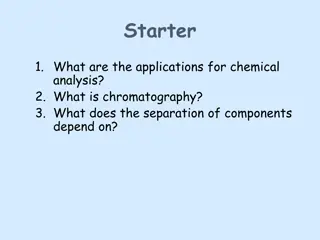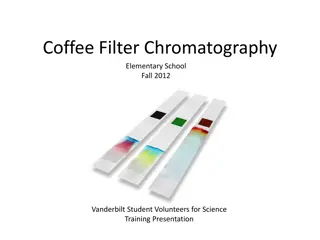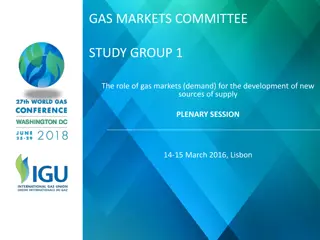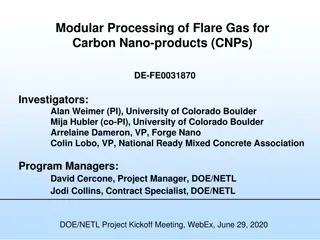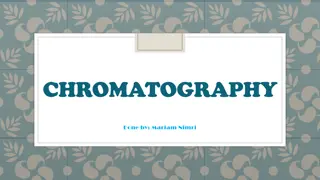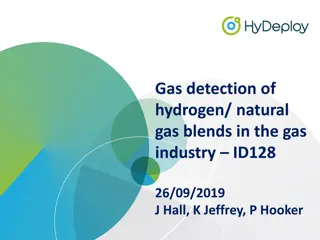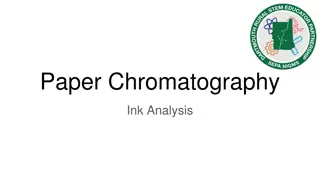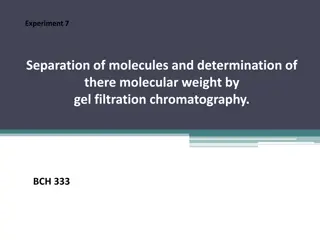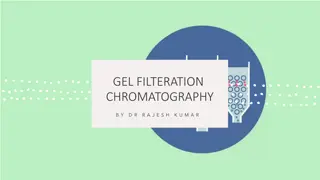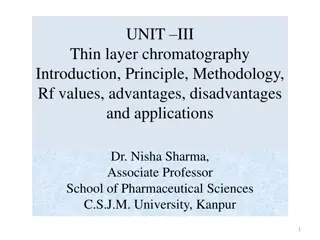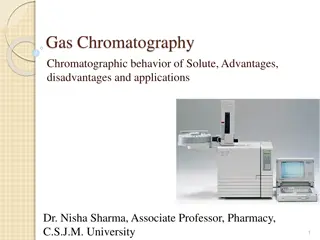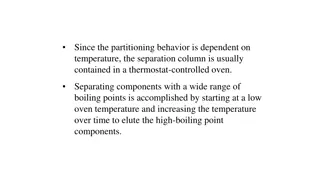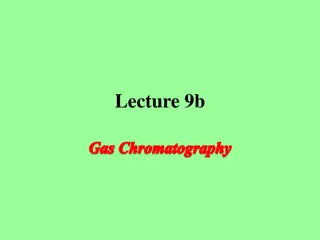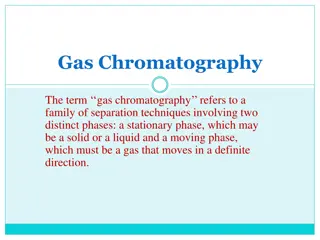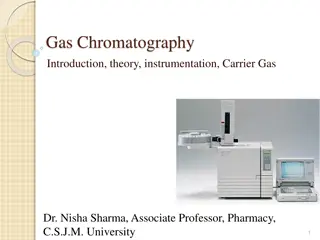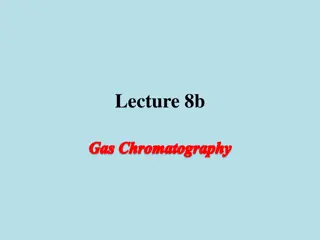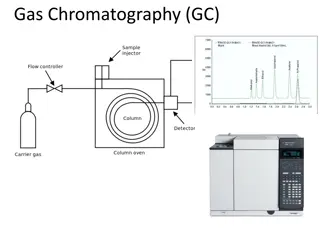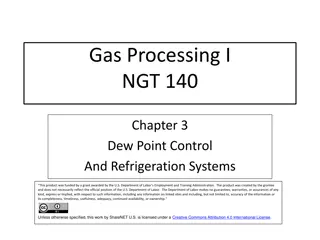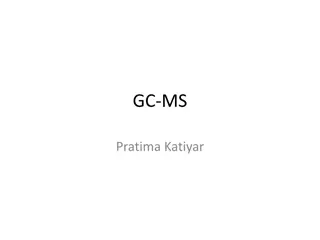Gas meters market
A gas meter is driven by the force of the moving gas in the pipe. Each time the dial with the lower value complete one revolution, the pointer on the next higher value dial moves ahead one digit. These meters are essential for ensuring adequate gas pressure from the main supply of natural or liquefi
2 views • 6 slides
mRNA Chromatography Applications: Resin Types and Purification Efficiency
This content delves into mRNA chromatography applications, focusing on the mRNA purification process using dT affinity chromatography, IEX, HIC, and RP techniques. It discusses the application of mRNA affinity resins like Monomix dT20 and Proteomix POR50-dT20, highlighting their properties, purifica
4 views • 8 slides
Chromatography Syringes Market
Chromatography Syringes are a critical component in chromatography used for ensuring high-precision measurement while transporting the sample between the storage vial and the instrument inlet. The selection of chromatography syringes depends on the injection valve type, sample properties, and inject
1 views • 3 slides
Chromatography Syringes Market
Chromatography Syringes are a critical component in chromatography used for ensuring high-precision measurement while transporting the sample between the storage vial and the instrument inlet. The selection of chromatography syringes depends on the injection valve type, sample properties, and inject
1 views • 3 slides
Chromatography Syringes Market
Chromatography Syringes are a critical component in chromatography used for ensuring high-precision measurement while transporting the sample between the storage vial and the instrument inlet. The selection of chromatography syringes depends on the injection valve type, sample properties, and inject
1 views • 3 slides
Chromatography Syringes Market
Chromatography Syringes are a critical component in chromatography used for ensuring high-precision measurement while transporting the sample between the storage vial and the instrument inlet. The selection of chromatography syringes depends on the injection valve type, sample properties, and inject
1 views • 3 slides
Gas Chromatography Detectors: Flame Ionization and Thermal Conductivity
Gas chromatography detectors play a crucial role in separating and analyzing compounds in the pharmaceutical field. The Flame Ionization Detector (FID) utilizes hydrogen flame to ionize compounds eluted from the column, while the Thermal Conductivity Detector (TCD) principle involves converting elec
0 views • 13 slides
Understanding Column Chromatography: Methodology, Advantages, Disadvantages, and Applications
Column chromatography, a type of adsorption chromatography, involves separating components based on their affinity to an adsorbent. The methodology includes passing a solvent through a column to improve separation, obtaining a chromatogram, and eluting components for analysis. The principle relies o
2 views • 24 slides
Understanding Natural Gas: Properties, Dangers, and Safety Measures
Explore the principles of natural gas, its chemical composition, properties, and potential dangers. Learn about gas formation, extraction, and usage. Discover how to manage gas leaks, prevent ignition, and ensure safety in handling natural gas. Gain insights into flammability, static electricity ris
0 views • 15 slides
Quantifying Substances in Mixtures Using Gas Chromatography
Gas chromatography is a precise method to quantify substances in mixtures, essential for various applications like food quality analysis, blood alcohol content testing, and developing green energy technologies. By accurately determining the identity and quantity of substances, such as pesticides in
2 views • 29 slides
Understanding HPLC: A Powerful Liquid Chromatography Technique
High-performance liquid chromatography (HPLC) is a powerful tool in analysis, offering high performance and speed compared to traditional chromatography methods. It involves separating components through a stationary phase and mobile phase, utilizing adsorption principles for separation. HPLC is wid
6 views • 58 slides
Gas Chromatography Equipment Overview: Components and Functions
Gas chromatography involves various components like gas cylinders, sample injection ports, and columns. The gas cylinder serves as a carrier gas reservoir with a pressure regulator. Sample introduction is through a column inlet/sample port injector. The GC injection syringe helps vaporize samples qu
0 views • 16 slides
Understanding Ion-Pair Chromatography (IPC): Theory and Applications
Ion-Pair Chromatography (IPC) involves adding ionic surfactants to a reversed-phase Chromatography system to affect retention and selectivity of ionic compounds. Developed by Dr. Gordon Schill, IPC is crucial for resolving hydrophilic samples and controlling selectivity in separations. The theory in
7 views • 18 slides
Understanding Column Chromatography Methods
Column Chromatography (CC) involves separating solutes based on different mechanisms within a packed column with a mobile phase. The five major types of CC are adsorption, partition, ion exchange, molecular exclusion, and affinity chromatography. Each type utilizes specific stationary and mobile pha
0 views • 11 slides
Understanding Paper and Thin Layer Chromatography (TLC) in Biochemistry
Chromatography techniques are used in laboratories to separate and identify components of mixtures. Paper chromatography is a type where a developing solution travels up a filter paper, separating compounds based on their affinity to the stationary phase. Thin Layer Chromatography (TLC) is a similar
0 views • 22 slides
Understanding Ion Exchange Chromatography in Analytical Chemistry
Ion exchange chromatography is a powerful separation technique that isolates ions and charged molecules based on their affinity for a charged matrix. This method involves interactions between the analyte and matrix influenced by factors like net charge, ionic strength, and pH. Through cation exchang
2 views • 18 slides
Understanding Chromatography in Biochemistry: A Visual Guide
Explore the world of chromatography through a series of informative images covering principles, classifications, procedures, and significance of techniques like paper chromatography and thin-layer chromatography (TLC). Delve into the R value, two-dimensional chromatography, and learn about partition
2 views • 44 slides
Gas Chromatography: Introduction, Theory, Instrumentation, Derivatization
Gas chromatography is a powerful analytical technique used for separating and analyzing volatile compounds. It involves a mobile gas phase passing through a stationary phase, with components in the mixture interacting differently, resulting in separation. The technique dates back to 1905 and has evo
0 views • 12 slides
Understanding Electron Capture Detector in Gas Chromatography
Gas Chromatography Detectors include the Electron Capture Detector (ECD), which detects ions exiting the chromatographic column by the anode electrode. It is commonly used for halogenated organics like insecticides and pesticides. The ECD works by capturing electrons from the carrier gas, leading to
1 views • 12 slides
Understanding Chromatography for Chemical Analysis
Explore the applications of chemical analysis, learn about chromatography as a technique for separating components based on size and polarity, conduct paper chromatography experiments, and analyze the results to understand the principles behind this method.
0 views • 7 slides
Coffee Filter Chromatography in Elementary School Science Presentation
Discover the fascinating world of chromatography through an engaging elementary school science presentation. Learn about mixtures, separation techniques, and the process of paper chromatography using food coloring dyes. Explore how chromatography can separate different components in mixtures and wit
0 views • 10 slides
Best Gas Dryer Services in Bickford Park
If you want the Best Gas Dryer Services in Bickford Park, visit AG Gas Solutions. They specialize in a wide range of services including gas stove repair, gas ranges, gas ovens, gas dryers, gas BBQs, gas pizza ovens, gas fire pits, pool heaters, dryer
1 views • 6 slides
Gas Markets Committee Study Group: Fueling the Future with Gas
The Gas Markets Committee Study Group 1 focuses on analyzing the role of gas markets in driving the development of new sources of supply, studying gas demand globally and in selected countries, and projecting gas supply up to 2040. The group discusses gas demand drivers, shares work progress through
0 views • 9 slides
Sustainable Conversion of Flare Gas into High-Value Carbon Nano-products
This project focuses on modular processing of flare gas to produce carbon nano-products, aiming to address the challenges of natural gas flaring in the United States. With a three-year timeline and a total budget of $3,750,000, the interdisciplinary team led by the University of Colorado Boulder see
0 views • 36 slides
Understanding Chromatography: A Practical Experiment
Chromatography is a process used to separate components of a mixture by employing a mobile phase that carries the mixture through a stationary phase. This experiment by Mariam Nimri explores the effects of different solvents on chromatography results, with a hypothesis that vinegar can impact pigmen
1 views • 10 slides
Gas Detection of Hydrogen/Natural Gas Blends in the Gas Industry
Gas detection instruments play a crucial role in assessing the presence of hazardous atmospheres in the gas industry. This study focuses on the impact of adding hydrogen up to 20% in natural gas blends on gas detection instruments. The aim is to understand any potential inaccuracies in readings and
0 views • 30 slides
Understanding Paper Chromatography: Ink Analysis & More
Explore the fascinating world of paper chromatography, a technique used to separate and analyze different pigments in ink. Learn how water and capillary action help reveal hidden colors in black ink, and discover the science behind chromatography terminology. Try a hands-on activity to conduct a col
1 views • 8 slides
Gel Filtration Chromatography: Separation and Molecular Weight Determination
Gel filtration chromatography is a method used for separating proteins based on their molecular weights. This experiment aims to teach students the principles of gel filtration chromatography and provide hands-on experience in the lab. By utilizing a stationary phase of porous beads and a mobile pha
0 views • 22 slides
Understanding Gel Filtration Chromatography: Principles and Applications
Gel filtration chromatography is a molecular size-based separation technique used to separate macromolecules of different sizes. This method, also known as gel permeation or size exclusion chromatography, utilizes a porous stationary phase where small molecules penetrate all pores and are retained,
1 views • 10 slides
Thin Layer Chromatography: Introduction, Principle, Methodology, and Applications
Thin Layer Chromatography (TLC) is a technique for separating and identifying compounds in a mixture based on adsorption. The principle involves the relative affinity of components to the stationary and mobile phases. The methodology is similar to paper chromatography, using coatings like silica gel
0 views • 21 slides
Gas Chromatography: Behavior of Solute, Advantages, Disadvantages, and Applications
Gas chromatography involves the chromatographic behavior of solutes in various ways such as retention volume, retention time, and partition coefficient. It offers advantages like good separation, short analysis time, and universal detectors for organic compounds. However, there are disadvantages suc
0 views • 15 slides
Understanding Gas Chromatography Techniques and Applications
Gas chromatography is a powerful analytical technique used for separating and analyzing volatile compounds in various industries such as food analysis and drug identification. The process involves a separation column contained in a thermostat-controlled oven, along with a carrier gas system and dete
0 views • 11 slides
Understanding Gas Chromatography: Theory and Applications
Gas chromatography is a widely used technique in various fields such as research, industry, forensics, and environmental analysis. This method allows for the separation and quantitation of compounds based on their different polarities or physical properties. The setup consists of key parts like an i
0 views • 10 slides
Understanding Gas Chromatography: Principles, Applications, and Strengths
Gas chromatography is a separation technique involving a stationary phase and a gas mobile phase. The principles involve flowing a gaseous mobile phase through a column for separation based on component interactions. While its use in drug analysis has declined with the advent of HPLC, GC is still va
1 views • 22 slides
Gas Chromatography: Introduction, Theory, and Instrumentation
Gas chromatography is a powerful analytical technique used to separate and analyze volatile substances. Originating in 1905, it involves the partition between a gas and a solid or liquid stationary phase. The theory revolves around retention time and the tentative identification of unknown compounds
0 views • 10 slides
Understanding Gas Chromatography: Basics, Theory, and Applications
Gas chromatography is a powerful analytical technique widely used in research, industrial quality control, forensics, and environmental analysis. This method separates compounds in a mixture based on polarity, boiling point, and interactions with the stationary phase. The setup includes components l
0 views • 10 slides
Exploring Gas Chromatography Techniques
Gas chromatography (GC) is a valuable analytical technique used in various fields like forensics, environmental analysis, and pharmaceuticals. This technology allows for the separation and analysis of complex mixtures, such as detecting alcohol levels in breath or THC in cannabis. The origins of gas
0 views • 45 slides
Gas Processing: Dew Point Control and Refrigeration Systems
Gas processing involves gathering raw gas from wells, passing it through various units like feed gas receiving, condensate stabilization, gas treating, dew point control, and refrigeration units to control liquid condensation and recover natural gas liquids. Dew point control helps prevent condensat
0 views • 26 slides
Gas Laws Review Game - Test Your Knowledge on Gas Concepts and Mixed Gas Laws
Get ready to test your knowledge on gas concepts and mixed gas laws with this interactive review game. Answer questions on gas properties, volume changes, pressure variations, and more. Challenge yourself and your team members as you solve problems related to gas laws. Improve your understanding and
0 views • 7 slides
Applications and Advantages of Gas Chromatography Mass Spectrometry (GC-MS)
Gas Chromatography Mass Spectrometry (GC-MS) is a powerful analytical technique that combines gas-liquid chromatography and mass spectrometry for substance identification. It offers superior performance with features like enhanced molecular ion, improved confidence in identification, wider sample ra
0 views • 10 slides



